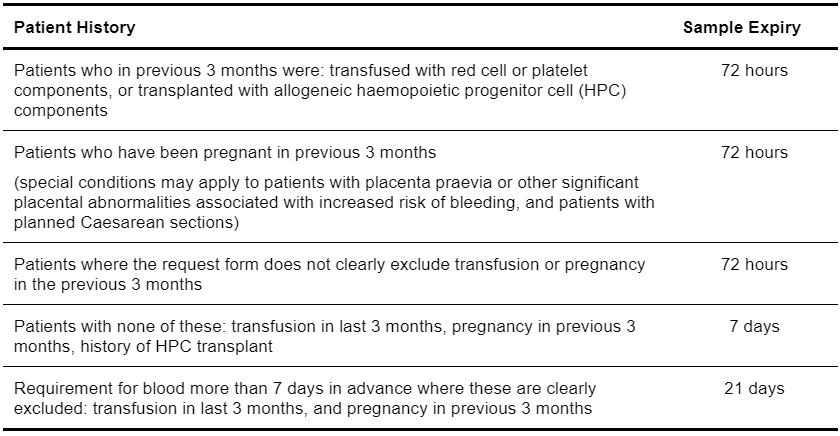Transfusion medicine
Transfusion medicine handbook
The Transfusion Medicine Handbook is designed to assist hospital staff and other health professionals in modern Transfusion Medicine Practice.
3. Guide to Good Transfusion Practice
3.9 Sample Validity (‘72-hour Rule’)
The sample validity period, during which time a pretransfusion sample may be held and used to provide crossmatched blood, depends on the patient’s transfusion or obstetric history.
Red cell antibodies can rapidly appear in response to stimulation by transfused red cells or as a result of pregnancy. Consequently, if in the three months preceding collection of the pretransfusion sample the patient has been transfused with red cells (or platelets), or is currently pregnant (or has been), the sample will have a validity of 72 hours. This is known as the ‘72-hour rule’.
Longer expiry times are applied if the patient is known not to have a history of transfusion or pregnancy.
Table 3.1: Sample Validity Criteria
For preadmission samples, the requirement for 21-day expiry must be clearly noted on the request form along with the proposed date of surgery or procedure. Details of whether or not the patient has a transfusion and/or obstetric history must also be given. Failure to provide this information will result in the sample being given a 72-hour expiry.
Once a transfusion episode has commenced the pretransfusion sample, and any associated results, will cease to be valid either at the original expiry of the sample, or 72 hours from when transfusion of the first unit commenced, whichever eventuates first.
If further transfusions are necessary, a new sample will be required. Each new sample will have an expiry of 72 hours until a gap of three months between transfusions (or since pregnancy) has occurred.
Extensions to sample expiry times may be possible at the discretion of a NZBS Transfusion Medicine Specialist/ Medical Officer. If you have any queries regarding sample validity, contact the local blood bank for advice.

